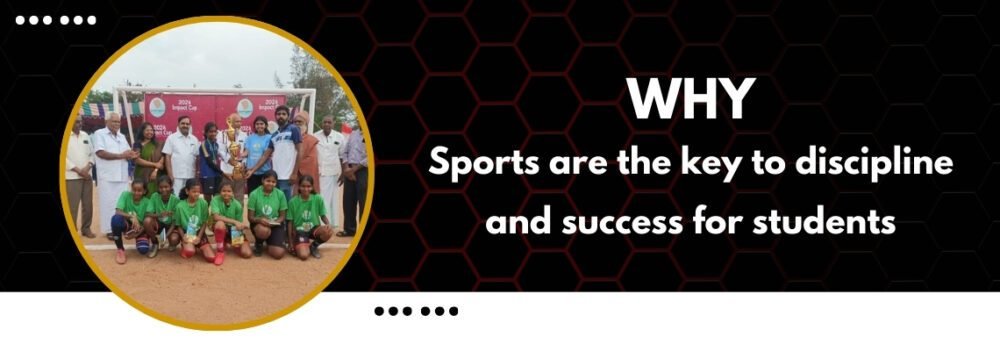Benefits of Sports for Students play a significant role in shaping a student’s life by building discipline and paving the way for success. Sports offer more than physical exercise; they create opportunities for young people to learn essential skills that extend well beyond the playing field. In this article, we will look at how sports help build strong character, improve time management, and provide valuable lessons that influence both academic performance and personal growth.
A Strong Start with Physical Health
Participation in sports is one of the best ways to maintain good physical health. When students take part in sports, they improve their strength, endurance, and flexibility. This active lifestyle can lead to better concentration and energy levels during classes. When the body is healthy, the mind works better, and students are more prepared to take on school challenges. Physical exercise has been shown to improve mood and reduce stress, allowing students to stay focused on their studies and perform better in the classroom.
Building Mental Strength Through Sports
Sports are not just about building muscles—they are also about building mental strength. When students participate in games and matches, they face challenges that test their resolve and decision-making skills. Overcoming setbacks in sports helps build resilience and encourages students to keep trying, even when things get tough. These experiences teach young people to handle pressure calmly, which can be very useful when facing academic tests or personal challenges. Sports help students learn that hard work and persistence lead to improvement and success.
Learning Discipline and Time Management
One of the most important lessons sports teach is discipline. Regular practice, adhering to game rules, and maintaining a schedule are all part of being a good athlete. This discipline translates directly into a student’s academic life. By managing time effectively between practice and study, students learn how to set priorities and use their time wisely. This balance between sports and academics encourages a routine that helps students stay organized and focused. The habits built through regular sports participation can lead to better study routines and more effective learning strategies.
The Value of Teamwork and Cooperation

Sports provide a great environment for learning how to work with others. When students join teams, they quickly understand that success often depends on cooperation and mutual support. Working in a team teaches students the importance of communication, trust, and sharing responsibilities. These lessons in teamwork are invaluable and prepare students for future group projects and collaborative work environments. Through sports, students learn that every member plays an important role, and together, they can achieve more than they would on their own.
Sports and Academic Success
Many educators agree that there is a strong link between regular participation in sports and academic success. Students who engage in physical activities tend to be more focused during lessons. The structured routine and clear goals in sports help improve concentration in class. Furthermore, sports teach students the value of practice and perseverance, which are key ingredients for academic improvement. This connection between physical activity and mental clarity often results in better grades and more confidence in tackling school assignments.
Resilience and Handling Failure
Another important lesson that sports teach is resilience. Not every game ends with a win, and experiencing loss is part of playing sports. When students face defeat, they learn to analyze what went wrong and work on improving their skills. This process of learning from mistakes is a vital life lesson. It helps build a mindset that views challenges as opportunities for growth. Understanding that setbacks are temporary and that persistence leads to eventual success is a lesson that students carry with them long after they leave the field.
Developing Social Skills and Building Friendships

Sports bring students together and help build strong social connections. Through practice sessions, matches, and team outings, students learn how to interact with peers, respect differences, and support each other. These interactions can build lasting friendships and a sense of community. The social skills learned on the field, such as effective communication and empathy, can improve a student’s ability to interact in various aspects of life, including school projects and future workplaces. Being part of a team gives students a sense of belonging and confidence that benefits them in many ways.
Lessons in Fair Play and Respect
Sports teach the importance of fair play and respect for others. Whether winning or losing, students learn to respect their opponents and the decisions of referees and coaches. These values are important both in school and later in life. Respecting rules and understanding the value of fairness helps students become responsible citizens who can contribute positively to society. Such values are essential for building trust and cooperation in any community.
Long-Term Impact on Personal Growth
The benefits of sports extend far beyond the school years. The skills and lessons learned through sports—such as discipline, teamwork, and resilience—continue to influence individuals well into adulthood. Many successful people credit their achievements to the habits they developed while playing sports. The confidence and determination gained from regular participation in sports help shape personal and professional success later in life. By participating in sports, students not only learn how to handle pressure but also gain a clear understanding of what it means to work hard and achieve a goal.
A Path to Discipline and Success
In summary, sports play a vital role in building a strong foundation for students. They provide the benefits of physical health, mental toughness, and valuable life lessons. Through sports, students learn discipline, time management, teamwork, and resilience. These experiences help prepare them for academic challenges and future careers. The benefits of sports for students are clear: they pave the way for a disciplined, focused, and successful future. With every practice session and game played, students build habits and learn lessons that guide them in every aspect of their lives.


